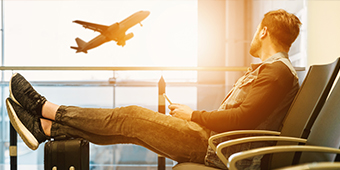Traveling with Diabetes – Tips to Stay Healthy on the Road or in the Air

Traveling is part of our lives and allows us to visit new places and learn about new cultures. As a diabetic there are extra precautions you should take prior to heading out on the road.
Here are some tips to make sure you are ready for your next trip:
Make a medication list and talk to your healthcare provider. You should know the names and doses of your medications and have them written down. It might also be a good idea to have your doctor write a letter explaining your medical prescriptions and supplies, in case you are questioned while traveling.
Receive Diabetes Wellness Tips!
Wear a medical identification bracelet that states you are a diabetic so that if you have medical complications while traveling medical personnel will know of your diagnosis.
If you are traveling to countries where another language is the primary language, it would be good to learn how to say diabetic, sugar, or orange juice in that language so you can communicate in the case of a dangerous blood sugar issue.
Take extra medications and pack them first. In many cases, people only pack the exact amount they will need, not accounting for trip delays. In other cases, people wait to pack their medications until last and they end up being left behind in the rush to get out the door.
In addition, be sure to keep the medication you will need during the trip in your carry-on or your personal handbag that you will have with you at all times. It is recommended to keep:
- Oral medications or insulin with syringes, pens, or pump supplies
- Other prescription medications (keep them in the pharmacy labeled containers)
- Glucometer with spare batteries, test strips, lancets, alcohol wipes or hand-washing gel (in 3 ounce container or smaller), and cotton balls or tissues
- Snacks such as crackers or dried fruit and nuts
- Glucose tablets or another sugar source
- Glucagon emergency kit, which can include a glucose-filled syringe to use in case of severe low blood sugar (talk to your healthcare provider about supplying this kit)
For all travel purposes, it is very important to have all of your medicines in official pharmacy-labeled containers.
It is also a good idea to tell people you are a diabetic. Good people to alert to your condition are hosts and hostesses at your destinations, flight attendants, trip guides or drivers, and travel companions.
It is a good idea to not pack your insulin in checked luggage because it might be exposed to extreme heat or cold which could damage it. If it is a long trip, carry your insulin in an insulated back with refrigerated gel packs.
While traveling, be smart about hydration. Drink plenty of water and avoid or limit alcohol. If your flight is serving food, request a diabetic meal ahead of time. If no meal will be provided, make sure to have a variety of snacks with you.
For more information on travel precautions or preparations, talk to your healthcare provider or make an appointment with Beebe Diabetes Management & Medical Nutrition: 302-645-3121. Beebe Diabetes Management is offering patients telemedicine appointments due to COVID-19. If you prefer an in-person appointment those are available with increased precautions as well.



